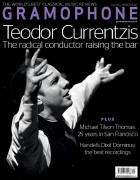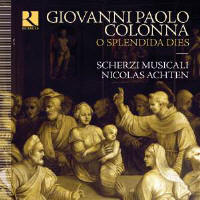Texte paru dans: / Appeared in:
|
|
|
Outil de traduction (Très approximatif) |
|
|
Reviewer:
David Vickers Giovanni Battista Colonna (1637-95) trained in Rome with Carissimi and Benevoli before returning home to Bologna, eventually becoming the long-serving maestro di cappella at San Petronio. Renowned as a master of both stile antico counterpoint and opulent large-scale polychoral concertato works, Colonna’s adeptness at more intimate and virtuoso modern-style motets is proved here by seven diverse pieces for soloists and basso continuo selected from his Motetti à due e trè voci, Op 3 (1681). Marc Vanscheeuwijck’s note suggests these might have been envisaged for Bologna’s smaller churches, or perhaps the Oratorio dei Filippini, rather than the colossal space and reverberant acoustic of San Petronio. Scherzi Musicali’s rotating squad of five singers varies combinations in each intricately contrapuntal and expressively rhetorical motet, such as the limpid fluidity of the sopranos Wei-Lian Huang and Gwendoline Blondeel in the duets Advolate fideles populi and Pulcra es (which has a dazzling quick ‘Alleluia’ conclusion), joined by the baritone Nicholas Achten in the rapturous trio Adeste superi. The firmertoned Griet De Geyter and gently ardent Achten navigate tricky fast divisions with assertive agility in O splendida dies. The countertenor Leandro Marziotte joins Achten and different sopranos in the vivacious trios Salve pretiosum and Libano caeli. In addition to his compassionate vocal contributions, Achten directs sensuously from the theorbo. Continuo accompaniments are further enriched by another theorbo and an archlute (the different sizes, tunings and registers of all three plucked instruments are showcased in a sonata), five-string bass violin and an Italian three-stop chamber organ – also heard in Colonna’s few extant solo organ pieces and a sonata by his assistant organist Giulio Cesare Arresti, played with suppleness by Mathieu Valfré. The revival of the fertile and innovative musical culture of 17th-century Bologna has lagged far behind the attention lavished on Venice, Rome and Naples – so this is an important landmark recording. |
|




